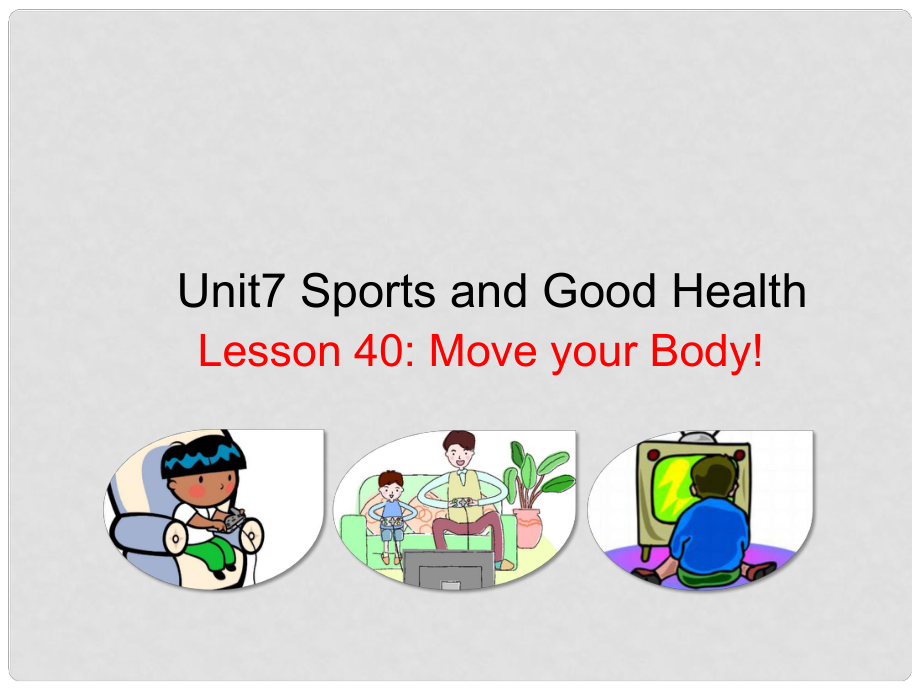《七年級(jí)英語(yǔ)下冊(cè) Unit 7 Sports and Good Health Lesson 40 Move Your Body課件 (新版)冀教版》由會(huì)員分享�����,可在線閱讀�����,更多相關(guān)《七年級(jí)英語(yǔ)下冊(cè) Unit 7 Sports and Good Health Lesson 40 Move Your Body課件 (新版)冀教版(18頁(yè)珍藏版)》請(qǐng)?jiān)谘b配圖網(wǎng)上搜索�����。
1�����、Unit7 Sports and Good HealthLesson 40: Move your Body!Preview1Presentation2Language Points3Exercise4. 短語(yǔ)互譯1. used to _2. not. . . any more _3. 體重增加�����;長(zhǎng)胖 _4. 出去 _5. 站在某人一邊�����;支持某人 _Preview過(guò)去常常 不再 put on weightget out on ones side. 句型展示1. 他們過(guò)去在一起常常很活躍�����。They _ _ _very active together. 2. 現(xiàn)在本為蒂姆擔(dān)心�����。Now Ben _ _
2�����、 Tim. 3. 讓我們?cè)陉?yáng)光下玩耍�����。Lets play _ _ _. 4. 我真的感到幸運(yùn)�����。I _ _ _ . used to be worries about in the sunfeel really lucky1. What did Ben and Tim often do before(以前)?2. Why does Ben worry about Tim?3. What does Ben send to Tim?Listen to the passage and then answer the questions.They often played games outdoors.B
3�����、ecause Tim watches too much TV and plays too many computer games.He sends him a poem.Presentation1.Listen to the statements and number the pictures.Read the lesson and write true (T) or false (F).1. Tim used to be very active. ( )2. Ben watches too much TV. ( )3. Ben and Tim are both putting on weig
4�����、ht. ( )4. Tim finds a letter at his desk. ( )5. Ben and Tim will meet and go for a good walk. ( )TFFFTFill in the blanks with the correct forms of the phrases in the box.worry about go for a walk put on weight uses to any more1.A: How do you go to school, Mike?B: I _ walk to school, but now I ride a
5、 bike.2.A: Be careful and dont stay out too late.B: Dont _ me, Mum! I will be OK!3.A: How is Tom these days?B: He doesnt get any exercise and he is not eating healthy food. He is _.used to worry about put on weight 4.A: You and Jason are neighbours, right?B: No. He moved to a new house. He is not my
6�����、 neighbour _.5.A: What do you like to do after supper?B: I like to _.any morego for a walk worry about go for a walk put on weight uses to any moreFill in the blanks with the correct forms of the phrases in the box.1.They used to be very active together. 他們過(guò)去在一起常常很活躍�����?����!军c(diǎn)撥】used to do 表示過(guò)去常常做某事�����,描述過(guò)去經(jīng)常發(fā)
7�����、生的動(dòng)作或存在的狀態(tài)�����,而現(xiàn)在卻不再發(fā)生�����。其中的to是不定式符號(hào)�����,不是介詞�����,所以其后接動(dòng)詞原形(不接動(dòng)名詞)�����。例如:He used to live in Paris. 他過(guò)去一直住在巴黎�����。Language points【用法辨析】與used to不同搭配的用法be used to doing意為“習(xí)慣于做某事”,其中的to是介詞,后接動(dòng)詞要用動(dòng)名詞He is used to living in the country.他已習(xí)慣于住在鄉(xiāng)下�����。be used to do sth.表示“被用來(lái)做某事”,是動(dòng)詞use的被動(dòng)語(yǔ)態(tài)結(jié)構(gòu)(此時(shí)意為“被用來(lái)”,其中的to為不定式符號(hào),其后要接動(dòng)詞原形)This k
8�����、ind of machine is used to make books.這種機(jī)器是用來(lái)制造書的。2. But I feel really lucky. 但是我真的感到幸運(yùn)�����?����!军c(diǎn)撥】lucky為形容詞�����,是由名詞luck加-y構(gòu)成的形容詞�����。其反義詞為unlucky�����。例如:You are lucky. 你是幸運(yùn)的�����?����!军c(diǎn)撥】lucky變形記luck名詞(不可數(shù)),意為“運(yùn)氣,好運(yùn),幸運(yùn)”Good luck!好運(yùn)!luckily副詞,意為“幸運(yùn)地,幸虧,僥幸”Luckily there was a doctor on the spot.幸運(yùn)的是現(xiàn)場(chǎng)有一位醫(yī)生�����。. 用所給詞的適當(dāng)形式填空1. My gr
9�����、andfather used to_ (live) in the country, but now he lives with us. 2. I began to put on _ (weigh) since I had these medicine. 3. The boy is _ (luck) to have a chance to speak to foreigners. Exerciseliveweightlucky4. Im on _ (you) side in this question. 5. Lets _ (visit) the Great Wall tomorrow. you
10�����、rvisit. 單項(xiàng)填空1. Dont spend _ time playing _ computer games. Its bad for you. A. too much; too much B. too many; too manyC. too much; too many D. too many; too much2. My father used to _ in a middle school. But now he works in a bank. A. work B. worked C. working D. works3. Dont worry _ your baby. He
11�����、is very well. A. at B. with C. about D. on4. Dont read books _ the sun. Its bad for your eyes. A. under B. in C. below D. on5. Dont smoke _. Its bad for your health. A. any much B. any moreC. no more D. manyWork in groups. Good friends are important. They help each other. Did a friend ever help you? Did you ever help a friend? What happened? Talk about it. HomeworkHomework
 七年級(jí)英語(yǔ)下冊(cè) Unit 7 Sports and Good Health Lesson 40 Move Your Body課件 (新版)冀教版
七年級(jí)英語(yǔ)下冊(cè) Unit 7 Sports and Good Health Lesson 40 Move Your Body課件 (新版)冀教版

